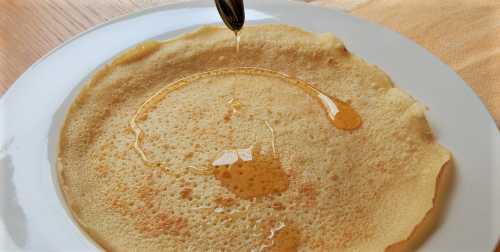TikTok Frozen Honey Challenge
5th August 2021
At the time of writing, there is a new ‘frozen honey TikTok challenge’ craze in which people freeze a bottle of honey for a couple of hours and then squeeze it out and eat it like a popsicle or ice pop. Some people have even added corn syrup to the honey.
Is eating frozen honey the same as eating a popsicle or ice pop?
No, a popsicle or ice pop is made of flavoured water. Honey has comparatively little water, typically less than 20%.
There is variation in sugar content, depending on the type of ice pop, but typically the sugar content may range from 14% to 16%. Honey is comprised predominantly of a range of sugars including fructose, glucose and others.
Frozen honey will therefore have far more calories than an average ice pop. Regular eating of large amounts of honey, including in its frozen form, could lead to weight gain.
What are the potential side effects of eating frozen honey as part of the TikTok challenge?
People are
complaining of:
- feeling sick (nausea), or
- of having diarrhoea;
- of bloating and abdominal
pain. T
Nausea
Commercial honey in the West is over 80%
sugar (mostly glucose and fructose), so consumption of a large amount of honey
means that the participant is eating a lot of sugar in one sitting. Of course, most people would experience nausea after eating very large amount of a sugary food.
Potential effect on blood sugar levels
Such a high volume of sugar could also cause a spike in blood sugar levels, which may upset the stomach. Ironically,
this spike in blood sugar level can also lead to a large spike
in insulin production.
This, in turn, may lead to something called ‘reactive hypoglycaemia’ - that is, low blood sugar (blood sugar below normal, healthy levels) soon after consuming a large amount of carbohydrate . This can also result in nausea that is being experienced by people who take part in the frozen honey challenge. Other symptoms of reactive hypoglycaemia include: confusion; shakiness; fatigue; sweating; blurred vision; a fast heart rate.
Diarrhoea
Eating a lot of fructose will lead to diarrhoea in people who have a low fructose tolerance.
Diabetes
Consuming large amounts of frozen honey could be dangerous for people with diabetes.
Tooth health
Anyone eating honey in moderation along with practicing good oral hygiene, is unlikely to see negative impact on their oral health caused by honey, despites its sugar content.
However, it seems to me that to have your teeth bathed in a ‘frozen’
foodstuff that is 80% sugar can not be good for them!

What does freezing do to honey?
Although honey can be frozen (without destroying its nutrients or causing harm to the honey itself), it does take extremely low temperatures that are not achieved by domestic freezers to do so (temperatures less than -51oc).
The temperature of a typical domestic freezer might be in the region of -4oC. It is not clear how this might affect the honey or the person eating it in large volumes.
Verdict
All in all, it seems that the current frozen honey challenge is one that is best avoided!
Honey articles
- Health Benefits of Honey A summary of the health claims and research around honey for healing wounds and burns, nutritional benefits, plus home remedies.
- Honey Nutrition A breakdown of the nutrient values of honey, with links to further information about its health benefits, energy values and more!
- Honey And Diabetes Is It Good To Eat Honey If You Are Diabetic?
- Honey For Burns - Is there clinical evidence to support its use? A look at a review of 26 clinical papers examining the use of honey to treat over 3000 patients with burns
- Honey For Cold Sores (Herpes) Given that honey has been used in wound healing and burn treatment, can honey be used for herpes?
- Does Honey Increase Blood Sugar Levels? What is the GI of honey? Whilst honey is made by honey bees, nevertheless, it is primarily comprised of different sugars.
- Is Honey Bad For Your Teeth? A balanced overview: effects of honey on tooth enamel and general oral health, and potential to cause or prevent cavities, with reference to scientific studies.
- Are Bees Killed For Honey? This question may be of concern not only to vegans, but also, anyone concerned about the welfare of honey bees.
- Why Babies Can't Have Honey: Honey And Infant Botulism Why babies under 12 months old can't have honey (even if cooked). How and why honey can cause infant botulism. When is it okay to give a child honey?
- Honey And Eczema Is there any clinical evidence to support the use of honey for treating eczema (atopic dermatitis)? A summary of a number of clinical papers.
If you found this page helpful or interesting, I'd really be grateful if you would share it with others - if not this page, perhaps another, such as Gardening For Bees.
Thank you so much :) .